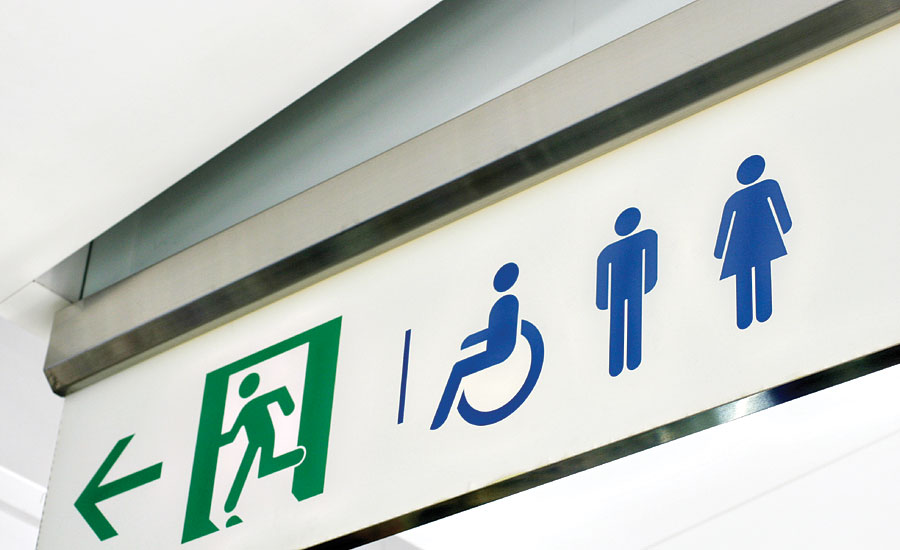The one thing you can always be assured of at ICC plumbing code hearings is that there will be some classic lines.
It must be that the pressure and intimidation of testifying at a hearing results in individuals making crazy statements.
Some of the comments made at April’s ICC hearings in Memphis included:
• “Potty parity is not a constitutional issue.”
• “The plumbing code is not concerned with the environment.”
• “ASPE didn’t go far enough.”
• “Water conservation is a green code issue, not a plumbing code issue.”
• “A tee wye fitting is not defined.”
• “Plumbing is more important than solar energy.”
All audience members can do is shake their heads and get a laugh later on when they recount the classic lines. Every line occurred during supposed technical discussions on code changes.
ASPE submitted a potty parity code change that would have required additional fixtures in the women’s room if more fixtures, beyond the code minimum, were added to the men’s room. This is where the civil rights issue was raised. Is it a civil right to have equivalency in availability of plumbing fixtures?
The ICC plumbing code committee did not believe so. It thought the code change would penalize the designer just because he or she chose to add more water closets and urinals to the men’s room. The committee was opposed to penalizing anyone for going beyond the minimum code requirements.
What the committee failed to acknowledge is without the change the code is not providing potty parity in all buildings. The committee did not seem to care. Someone in the back of the room commented, “Look at the panel on the dias, it’s all men.” Hence, did they get it? The answer is, “no.” The code change was recommended for denial.
The follow-up conversation regarding constitutional issues went something like this:
“How can potty parity be a civil rights issue?”
“It falls under the equal protection of the law.”
“What’s that got to do with the plumbing code?”
“The plumbing code is adopted by states and local jurisdictions as the law.”
“Oh, how are we supposed to know what the constitution states?”
It is interesting that the IAPMO Uniform Plumbing Code is much more geared to the issue of potty parity. The penalty, as the ICC committee calls it, has been a part of the Uniform Plumbing Code for many years.
The statements regarding the environment and water conservation occurred during discussions on the series of code changes proposing reduced water usage numbers. There were many statements regarding the plumbing code not being the document to save water. That should be the responsibility of the Green Code. The problem with such a statement is that the International Plumbing Code has always had water conservation requirements.
Some of the objections to changing the water conservation requirements were centered on the federal preemption. Only states can adopt water use values less than the federal levels. Therefore, opponents to the low-flow and flush rates harped on the federal preemption. When the ASPE change on flow rates came to the floor, this argument could not be used since ASPE proposed a requirement for a dual flush if the flush rate was 1.6 gpf. Otherwise, the flush rate would have to be 1.28 gpf. Even that issue fell into the discussion that it is a Green Code requirement and not a plumbing code requirement. All the water conservation code changes were recommended for denial.
Bad combinations
ASPE seemed to not be respected as the leading plumbing engineering authority. The Plumbing Code Committee opposed almost every ASPE change proposal. One that had generated some heated discussion was combination waste and vent systems. One of the committee members stated ASPE didn’t go far enough in the investigation of the performance of combination waste and vent systems when a food waste disposer is connected.
The engineer who oversaw the research rose and took exception to the statement. The committee member admitted he didn’t review the video or the full report published by the ASPE Research Foundation. None of that mattered; the code change was recommended for denial.
All the ASPE changes regarding storm drainage and rainwater collection also were recommended for denial. The only ASPE change recommended for approval was the revision to emergency fixtures requiring an ASSE 1071 thermostatic mixing valve when hot and cold water is supplied to the emergency fixture.
The comment on tee wyes related to a new table for distance from trap to vent. This change addressed an issue commonly raised by engineers, “Can you install a tee wye rather than a sanitary tee in the wall to receive sink or lavatory waste with the vent extending upward above the fitting?” This installation currently is prohibited by the plumbing code. However, all the studies have shown that a connection to a tee wye is acceptable if the distance from trap to vent is very short. Unfortunately, the change was recommended for denial since the committee didn’t have a definition of tee wye.
The solar industry has a problem with a plumbing vent extending 12 in. through the roof. Many photovoltaic solar panels only have a 5-in. air space between the roof and the bottom of the panel. So, the vent through the roof distances needs to be shortened, otherwise an entire solar panel and associated energy is lost on the roof.
The studies and documentation verified the vent could be shortened through the roof. No one spoke in opposition to the code change. However, the committee had a problem with any change to the sacred vent. That is when the statement that plumbing is more important than solar energy was made by a committee member. The change was recommended for denial.
What many observers noted was the committee gets punchy after sitting on the dias for a long period of time. The ICC process has the committee hearing testimony from 8 a.m. to 7 p.m., with a break in the morning, an hour lunch break and a break in the afternoon. This schedule is exhausting to the committee. In ICC’s defense, it has attempted many different options to keep the committees fresh.
Additional code change activity will be reviewed in my June column. To obtain the results of the code hearing, you can view or download them on the ICC’s cpdaccess website which is http://www.cpdaccess.com.
This article was originally titled “Potty parity is not important” in the May 2015 print edition of pme.


